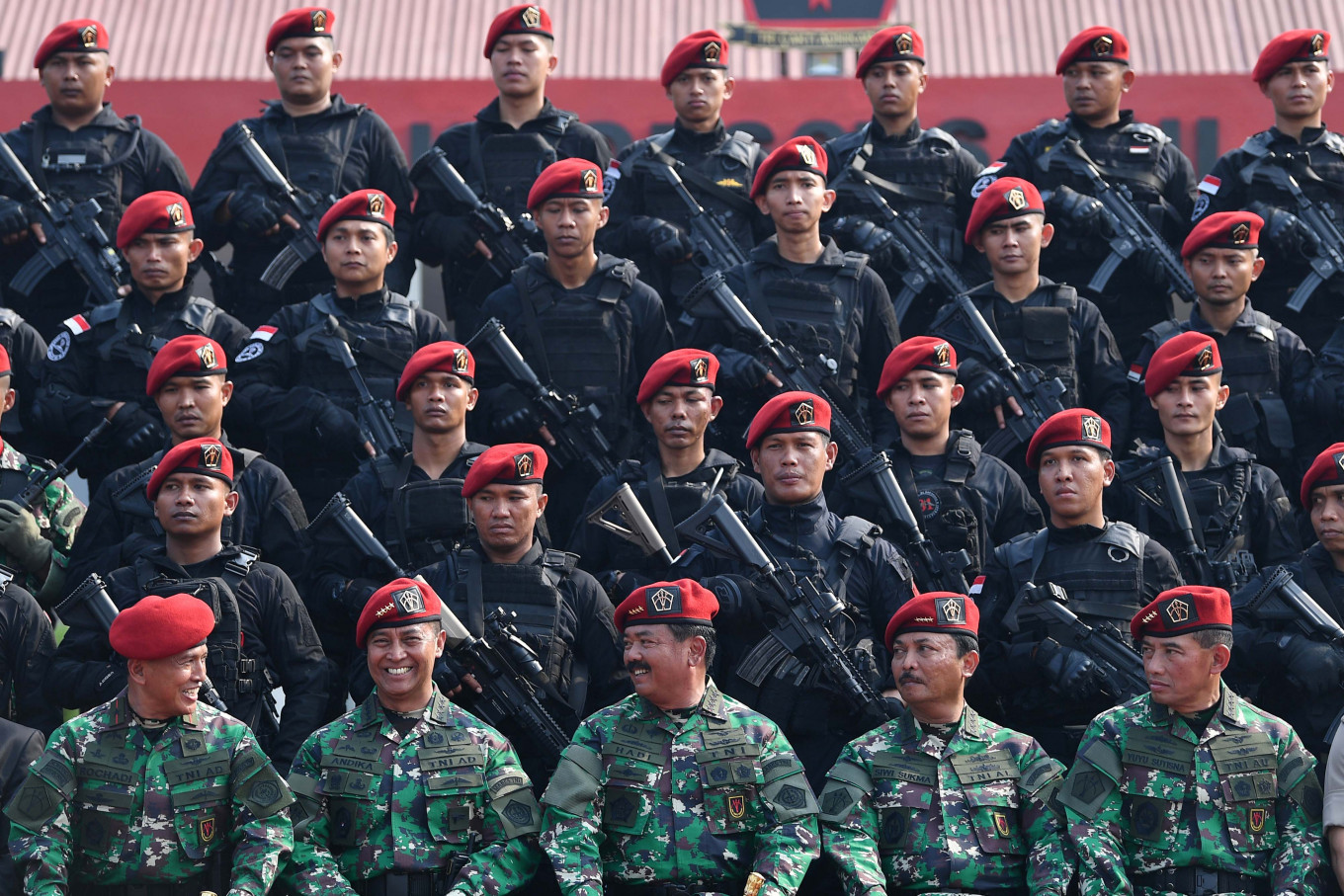Popular Reads
Top Results
Can't find what you're looking for?
View all search resultsPopular Reads
Top Results
Can't find what you're looking for?
View all search resultsUrgency vs clarity of TNI unit
Change text size
Gift Premium Articles
to Anyone
 Indonesian Military (TNI) commander Air Chief Marshall Hadi Tjahjanto (front center), Army chief of staff Gen. Andika Perkasa (second left), Navy chief of staff Admiral Siwi Suka Adji (second right) and Air Force chief of staff Air Chief Marshall Yuyu Sutisna (right) chat with Special Operations Command (Koopssus) commander Brig. Gen. Rochadi (left) during the inauguration of Koopssus at the TNI headquarters in Cilangkap, Jakarta, on Tuesday. (ANTARA FOTO/Sigid Kurniawan)
Indonesian Military (TNI) commander Air Chief Marshall Hadi Tjahjanto (front center), Army chief of staff Gen. Andika Perkasa (second left), Navy chief of staff Admiral Siwi Suka Adji (second right) and Air Force chief of staff Air Chief Marshall Yuyu Sutisna (right) chat with Special Operations Command (Koopssus) commander Brig. Gen. Rochadi (left) during the inauguration of Koopssus at the TNI headquarters in Cilangkap, Jakarta, on Tuesday. (ANTARA FOTO/Sigid Kurniawan)
T
he government’s decision to establish the Special Operations Command (Koopssus) — a joint unit of selected soldiers of elite forces of the three military branches about as big as a military battalion — has received mixed reactions. Many have expressed support, while others exercise caution prior to approving the new unit of the Indonesian Military (TNI).
The special command, founded with a decree by President Joko “Jokowi” Widodo, will comprise top soldiers of the antiterror detachment of the Army’s Special Forces (Kopassus), the Jalamengkara detachment of the Navy’s Marine Corp and the Bravo 90 detachment of the Air Force’s Special Forces Corps. The command is tasked with dealing with national security emergencies.
The Koopssus’ establishment is controversial for a number of issues. First, the special command is not completely a new joint unit of the TNI. It is a revival of a similar unit with a different acronym, the Koopssusgab (Joint Special Operations Command) — introduced by then-TNI chief Gen. Moeldoko in 2015 to tackle terrorist threats in the country. However, it was later suspended by Moeldoko’s successor, Gatot Nurmantyo.
The timing of the Koopssus’ establishment, launched at the TNI headquarters in Cilangkap, East Jakarta, on Tuesday, is also controversial. The presidential regulation (Perpres) on its existence was signed on July 3, a few weeks before the Constitutional Court issued its ruling on a lawsuit filed by losing presidential candidate pair Prabowo Subianto-Sandiaga Uno, who challenged the election victory of Jokowi-Ma’ruf Amin. Security authorities had reportedly anticipated violence amid the planned massive presence of Prabowo-Sandiaga supporters ahead of the court ruling on June 27.
The presence of the new military unit nearly escaped the public’s radar as the President’s approval on the Koopssus’ establishment was only made available on the Cabinet Secretary website, setkab.go.id, on July 18.
Last, the new unit is also controversial given the lack of clarity in the presidential regulation, particularly on the unit’s rules of engagement. It begins with the minimal data and information available on the unit’s range of operational tasks and responsibilities. The Perpres has yet to clearly define national security emergencies, whether they are merely about terrorist threats as it was meant for Koopssusgab in 2015 or far beyond that.
Should the new elite force focus only on counterterrorism, there must be further division of labor between Koopssus and the existing Densus 88 counterterror squad of the National Police and the National Counterterrorism Agency (BNPT). And if Koopssus is designed to deal with much greater national security threats, it should also be made clear so as to provide clarity and prevent overlapping roles and responsibilities among security institutions in the country.
The nation’s security sector reform has much work to do to improve its professionalism, including the TNI’s credibility. The public highly appreciates all efforts to safeguard them, however, clarity is urgent on how and when such an elite force should employ its sophisticated skills with the support of state resources, without repeating abuses of the past.









